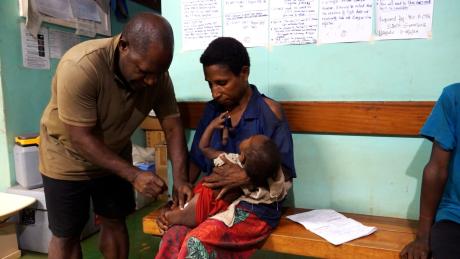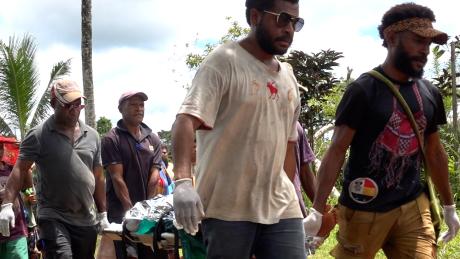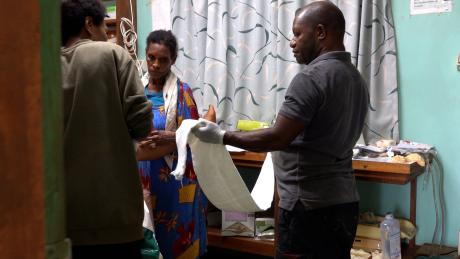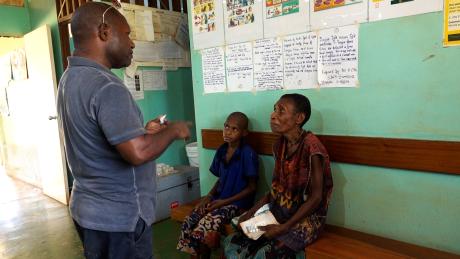
Paul Isilawa has dedicated over two decades to healthcare and he says patients in communities like Mougulu would not survive without MAF flights.
Story by Mandy Glass
Life in Mougulu is marked by isolation and the absence of roads. Patients often walk for hours—sometimes days—to seek medical care at its clinic.
Community health worker Paul Isilawa and his team of five see up to 50 patients a day, treating conditions like malaria, pneumonia, tuberculosis, accidents, snakebites and all sorts of injuries while providing antenatal care and maternity service. The challenges are immense: limited staff, a lack of diagnostic equipment, and the overwhelming needs of the population.
When we hear the plane come in, we feel very happy and relieved, so the patient can be taken to a bigger hospital.
One recent case involved a mother from Dodomona, a 12-hour walk from Mougulu. She was already transferred to Mougulu by MAF as the Dodomona community health worker expected childbirth difficulties. Then the labour began with a breech presentation of the baby.
With no doctor on-site and minimal resources, Paul’s team relied on MAF to medevac her to Tabubil hospital with an obstetrician on site. Though the baby was lost, the mother survived — a testament to the collaboration between the clinic and MAF.

In a region where walking to the nearest town with better medical facilities can take days or weeks, MAF is indispensable and the roar of a plane arriving is the most happy and hopeful sound.
“If MAF wasn’t here, I think all these clinics would be closed. MAF does a lot of work—they help bring medicines, which allows us to keep our health clinic running. They also assist with medevacs and many other things,” said Paul.
“Even when we need supplies from town, they help us get them here. MAF is the lifeline of life. If MAF wasn’t there, I think all the people in here should be dead.
“During emergencies, many thoughts run through our minds while we are in the clinic, trying to manage without a doctor to help. But when we hear the plane come in, we feel very happy and relieved, so the patient can be taken to a bigger hospital for the help [they need]. We feel very proud when the plane comes.”

Born and raised in the Biami people group, which is now part of the Middle Fly District, Paul’s journey to be working as a community health worker has been deeply influenced by his upbringing, his passion for serving his people and the support of MAF.
His father, the first Christian convert of the Biami tribe, grew up and worked alongside the missionaries Tom and Salome Hoey to bring faith and change to a community once torn by cannibalism and conflict. After his father’s death, Paul embraced the values instilled in him, wanting to become a schoolteacher.
However, life took a different turn as Paul was given the opportunity to train in the healthcare sector. He completed his training at Rumginae and later obtained a diploma in health education at Goroka. Now, while he treats patients, he’s also educating his community.

“Instead of teaching students in a classroom, I can teach people how to take care of themselves. I can say I have achieved what I aimed for,” he said.
His passion for teaching is still strong, driving his vision for better service to his people.
“One of the biggest challenges is that we need more staff,” Paul said. “With more staff, instead of just giving medicines here at the clinic, we could go out and give health talks to teach people how to care for themselves at home. This would reduce the number of patients coming to the clinic. That's the biggest challenge—we need more staff to educate people, run more clinics, and help prevent sickness.”
His faith sustains him, as he witnesses God’s provision through answered prayers, unexpected resources and as MAF planes come to assist in emergencies.
“We see God at work when we are in need… but somehow when we pray and ask God it just happened that those things that we need just come, and patients are healed. I thank God that he is here [with us] as well,” Paul said with a big smile.